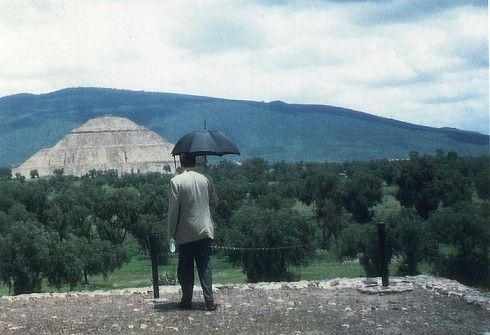Geography Faculty
 Stephen Bell
Stephen Bell
Ph.D. University of Toronto, 1991
Email: sbell@geog.ucla.edu
Mailing Address: c/o Department of Geography
University of California, Los Angeles
Los Angeles, CA 90095-1524
Office: 1161 Bunche Hall,
UCLA Phone: (310) 825-1619
Fax: (310) 206-5976
Associate Professor
Current Fields of Interest: Historical geography; Latin America, especially Brazil and the southern cone region; the evolution of the world economy; European travelers in South America

On the Pyramid of the Sun at Teotihuacan, the First True Urban Center in the Western Hemisphere, August 1999
Although I claim catholic tastes in human geography, my main interest lies with historical geography, broadly construed. My main regional interest is Latin America and the geography of its transformation - past and present - since around 1800. I have conducted extensive archival fieldwork on South America, within the region itself and in western European collections. My direct experience has been in southern Brazil, Uruguay and Argentina. As a recent reviewer of my work correctly saw, I share with historians "the conviction that work in archival sources constitutes the bedrock of research." Most of my research falls under the broad umbrella of European influence (and its consequences) in southern South America. Another frame for viewing this is the lateral extension of the Industrial Revolution and the accompanying cultural confrontations. The heavy infusion of modernization into Latin American societies during the latter half of the nineteenth century resulted in what the late UCLA history professor E. Bradford Burns argued "was probably the greatest cultural confrontation in the New World since the early sixteenth century." There is much in this theme still calling for research.
My first major project took up the problem of the slow transformation of ranching along Brazil's southern frontier, the Campanha region of Rio Grande do Sul. Why did the modernization of ranching in this, the most important ranching region of Brazil, display sharply uneven patterns in time and space? What were the mechanisms that drove technical innovations in ranching? My research showed how important structural obstacles slowed development: national political support for reforming legal aspects of property rights in this peripheral region was weak; linkages between domestic elites and foreign merchants were insubstantial; and Rio Grande do Sul's infrastructure and attraction of foreign capital remained limited. The results of this work have now been published in monograph form. As part of this project, I also investigated the comparative bases of early industrialization in the South Atlantic, contrasting patterns of ownership and innovation in the salt-beef plants of southern Brazil with those of neighboring Uruguay and Argentina.
My current major research focus concerns the South American career of the French scientific traveler Aimé Bonpland (1773-1858). He is remembered mainly for his work in collaboration with Alexander von Humboldt in the celebrated journey through equinoctial America (1799-1804). My interest in Bonpland was stimulated by finding unpublished manuscripts by him in Brazilian archives during some of my earlier field research. For the last 42 years of his life, he resided in southern South America, living from a wide range of occupations, including farmer, rancher, medical doctor, government scientific consultant and political conspirator. Reflecting the turbulent politics of the early independent period in South America, his activities ranged over parts of Argentina, Paraguay, Brazil and Uruguay. This allowed him to make extensive comparative field observations. These records, still mainly unpublished, offer an extraordinary window for the study of both the physical and the human environments of a region roughly a thousand kilometers square. They are of central importance for studying the environmental history of South America. My research on Bonpland is also deepening a long-held interest in the various roles of northwest Europeans in South American development.
Selected Publications:
“Individual Agency and Ecological Imperialism: Aimé Bonpland in Southern South America,” in: Territories, Commodities and Knowledges: Latin American Environmental History in the Nineteenth and Twentieth Centuries, ed. Christian Brannstrom (London: Institute for the Study of the Americas, 2004), 247-72.
Campanha Gaúcha: A Brazilian Ranching System, 1850-1920 (Stanford, CA.: Stanford University Press, 1998)
"Aimé Bonpland and Merinomania in Southern South America," The Americas 51, 3 (1995): 301-23
"Early Industrialization in the South Atlantic: Political Influences on the Charqueadas of Rio Grande do Sul Before 1860," Journal of Historical Geography 19, 4 (1993): 399-411
Recent Awards:
The Warren Dean Memorial Prize of the Conference on Latin American History (1999), awarded for Campanha Gaúcha
Social Sciences and Humanities of Canada Postdoctoral Research Fellowship (1995-97), held at McGill University